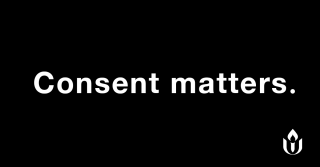Faithful Consent Discussion Guide
By Susan Lawrence, Nao Bethea

Here’s a guide for a 60 — 90 minute conversation to accompany the Faithful Consent videos. Use the elements that speak to you and work for your intended group.

Photo by Zackary Drucker for The Gender Spectrum Collection, licensed under CC BY-NC-ND 4.0
Preparation
Consent starts with ourselves, so decide carefully who you’re willing/wanting to have this conversation with. Perhaps it’s a group of close friends, your activist/organizing group, or people in your faith community. Maybe you feel comfortable having this convo with your family or a hobby group. As long as it’s a group that has some shared values, spending time in strengthening your understanding of consent together can have ripple effects out into your wider community.
It’s highly likely that someone in your group has experienced sexual assault or other serious violations of consent. Or they might know someone who has. This session is NOT meant to be a group therapy session for past or current trauma, although participation may incidentally provide some people with therapeutic effects. As the convener, decide whether you want to have a counselor or religious professional present to support participants who may share their stories. You may need to gently redirect the conversation if it veers toward group processing of someone’s story. Attend closely to the tone and nature of comments so that the conversation stays within community agreement or covenant. Plan to have a list of resources or referrals and provide compassionate follow-up care for anyone who needs it.
Materials
Candle and lighter (or LED!), Optional: Chalice to hold the candle
Computer with Internet access and large monitor or digital projector and screen
A way to project or write questions for all to see
Journals/paper and writing implements
Copies of a list of resources or referrals to help survivors in your local area (start with the National Sexual Violence Resource Center’s “Find Help” section if needed)
Before You Start
Decide whether your group will view and reflect on the additional videos and questions for men, parents/caregivers, and Unitarian Universalists.
Write out or find a way to project the prompt questions you plan to share from below.
Test A/V equipment and cue videos to be shown.
Choose which opening words you plan to share from below.
Creating a Safe Space
Welcome everyone to the conversation and briefly share your personal, spiritual, and/or political reasons for hosting. Share why consent matters to you.
Before you get started, tell the group the purpose of the conversation:
To engage deeply with our concepts of consent.
To examine where we learned our beliefs about consent.
To imagine how we can create a culture of faithful consent in our families and communities.
Offer a summary of the session:
Opening words
Creating or reviewing a covenant or community agreement
Watching a 6-minute video featuring clips of interviews with consent advocates
Reflecting or journaling in response to questions about consent for five minutes
Sharing our reflections with the group if we want (not required)
(Optional additional video clips for certain groups)
Closing words
Make a point that the likelihood is high that someone in the group may be a survivor of assault or serious violation of consent. Make it clear that although this is a compassionate space, this is not meant to be a group therapy session. State that folx are welcome to briefly share their experiences to provide a context for their perspective, but that details and ongoing trauma are best shared with a professional counselor. Hand out copies of a list or share the resources you know about in your local area.
Light a chalice or a small candle to mark the beginning of the group’s time together.
Read either of these suggested opening words (1 or 2):
An excerpt from a blessing by Andrew Pakula:
Spirit of love and mystery; help us to recognize the spark of the divine that resides within each of us.
May we know the joy of wholeness.
May we know the joy of being together.
An excerpt from opening words by Rev. Erika Hewitt:
With full hearts,
we affirm our relationships with one another;
we recognize our agency and our connective power;
and we accept our responsibility to be bold and courageous.
Briefly create community guidelines or review a covenant familiar to the group. Make sure confidentiality, safety, equity, and trust are established as norms and that all agree. Here’s a sample covenant:
- Speak from one’s own experience and perspective.
- Listen generously to the experiences and perspectives of others.
- Resist making assumptions about one another.
- Be mindful of “taking space and making space” so that all have opportunities to listen and speak.
- Expect and respect confidentiality of others’ sharing.
- Expect and accept that questions may linger.
Viewing & Reflection
Show the full length Faithful Consent video.
Invite folx to take a few minutes to reflect silently, journaling if they wish, on any of the following interview questions from the video. Display the questions and read them aloud:
Why does consent matter?
What is one myth about consent?
What does your faith say about consent?
How can we create more understanding about consent?
Offer 3 — 5 minutes for reflection and journaling. Monitor and check in with how long it seems to take the group to gather their thoughts.
Sharing & Conversation
Regather the group. Invite them to engage in “serial testimony”: responding as they’re moved to speak. Encourage the group to refrain from interrupting, taking over someone’s story, asking for details, or advice-giving. Say that it’s fine to pass if they don’t have anything to share. You may want to invite people to keep their initial contribution to one or two minutes. Make sure that everyone who wishes has a chance to speak.
Optional: Additional Videos & Questions
If the group includes men, parents/caregivers, or Unitarian Universalists, you may choose to show these additional, shorter clips and engage in another round of reflection and sharing. Add at least 15 minutes for each.
Question: How can men talk to other men about consent?
Video Clip for Parents/Caregivers of Teens
Question: Why is it important to talk with your teen about consent?
Video Clip for Unitarian Universalists
Question: How do your Unitarian Universalist values relate to consent?
If you have time, invite participants to continue in conversation. Remind them to observe the community agreement/covenant you’ve agreed to. Gently indicate if a person needs to make space for others to speak — the conversation shouldn’t be dominated by one or a few.
Closing
As time draws to an end, invite the group into a moment of shared silence.
Lead the group to take a deep breath together.
Read or invite a volunteer to read these closing words, by the Rev. Theresa I. Soto, used with permission from their book, Spilling the Light (Skinner House, 2019):
To be free, you must embrace
the breadth of your own existence
without apology, even if they try to take
it from you. You must know, not that you
can do whatever you want; you are not
a kudzu vine, eating entire hillsides for
the purpose of feeding your own lush life. You
must know instead, that inside you are entire
Universes—milky blue, magenta, and gold—
expanding. But to actually be free, you must
know and you must fight for the entire
Universes inside of everyone else.
Being free is not a license, but
A promise.
Extinguish your chalice or candle.
Follow Up
If your group is interested in widening your impact and creating a culture of faithful consent in your community, support or start a local effort to offer the Our Whole Lives (OWL) program. OWL is a set of comprehensive sexuality education curricula which provide an opportunity to learn about the boundaries of healthy relationships, all the way from kindergarten to older adults.
More information about this project…
What is the Unitarian Universalist Association?
Faithful Consent is a video project by the Unitarian Universalist Association (UUA), the central organization for the Unitarian Universalist (UU) religious movement in the United States. Unitarian Universalists affirm and promote seven Principles, grounded in the world’s religions. Our spirituality draws from scripture and science, nature and philosophy, personal experience and ancient tradition as described in our six Sources. For more information, visit uua.org/beliefs.
Why did the Unitarian Universalist Association produce Faithful Consent?
The UUA has a commitment to sexuality education that centers autonomy, empowerment, fluidity, and consent. We affirm this commitment through Our Whole Lives (OWL), our comprehensive, lifespan sexuality education curricula for use in both secular settings and faith communities. OWL dismantles stereotypes and assumptions, builds self-acceptance and self-esteem, fosters healthy relationships, improves decision making, and has the potential to save lives. OWL is a joint project between the UUA and the United Church of Christ. For more information about OWL, visit uua.org/re/owl.
The UUA has four justice priorities, including: criminalization, electoral justice, climate justice, and LGBTQ+/Gender Justice. This video highlights themes related to the UUA’s LGBTQ+/Gender Justice work.
